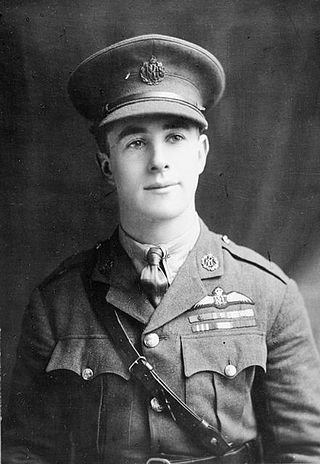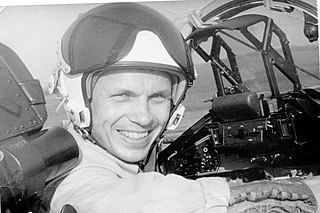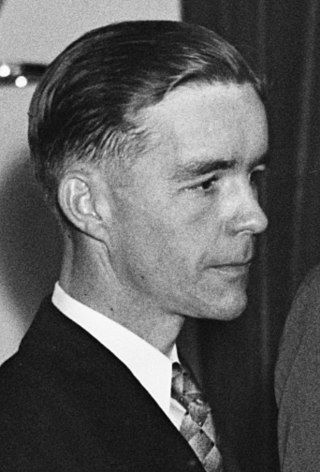
A salute is usually a formal hand gesture or other action used to display respect in military situations. Salutes are primarily associated with the military and law enforcement, but many civilian organizations, such as Girl Guides, Boy Scouts and the Salvation Army use formal salutes. Ordinary civilians also salute informally to greet or acknowledge the presence of another person, such as a tip of the hat or a hand wave to a friend or neighbor.

Marine Corps Air Station El Toro was a United States Marine Corps Air Station located next to the community of El Toro and was then adjacent to the city of Irvine.

A flight engineer (FE), also sometimes called an air engineer, is the member of an aircraft's flight crew who monitors and operates its complex aircraft systems. In the early era of aviation, the position was sometimes referred to as the "air mechanic". Flight engineers can still be found on some larger fixed-wing airplanes and helicopters. A similar crew position exists on some spacecraft. In most modern aircraft, their complex systems are both monitored and adjusted by electronic microprocessors and computers, resulting in the elimination of the flight engineer's position.
This is a list of aviation-related events from 1920:

The Sikorsky S-29-A was a twin-engine sesquiplane airliner, first flown in 1924. It was the first aircraft that aviation pioneer Igor Sikorsky designed and built after coming to the United States, hence the special "-A" suffix signifying "America". The aircraft made many successful long-range flights, most of which Sikorsky piloted himself. The S-29-A claims a number of "firsts" in aviation, including the first twin-engine aircraft capable of maintaining altitude on one engine, the first aircraft to broadcast a radio musical program in-flight, in 1925 and in 1926 the first aircraft to display a motion picture in flight. The S-29-A was also one of the first aircraft to make use of an airstair door, located on the starboard side of the fuselage.

Aircrew are personnel who operate an aircraft while in flight. The composition of a flight's crew depends on the type of aircraft, plus the flight's duration and purpose.

A powered parachute, often abbreviated PPC, and also called a motorized parachute or paraplane, is a type of aircraft that consists of a parafoil with a motor and wheels.

James Thomas Byford McCudden, was an English flying ace of the First World War and among the most highly decorated airmen in British military history. Born in 1895 to a middle class family with military traditions, McCudden joined the Royal Engineers in 1910. Having an interest in mechanics he transferred to the Royal Flying Corps (RFC) in 1913 at which time he first came into regular contact with aircraft. At the outbreak of war in 1914 he flew as an observer before training as a fighter pilot in 1916.

Nationwide Airlines was an airline based in Lanseria, South Africa. It operated scheduled domestic and international services. Its main base was OR Tambo International Airport, Johannesburg. On 29 April 2008, the airline ended operations.

Air Midwest Flight 5481 was a Beechcraft 1900D on a regularly scheduled passenger flight from Charlotte Douglas International Airport in Charlotte, North Carolina, to Greenville–Spartanburg International Airport in Greer, South Carolina. On the morning of January 8, 2003, the Beechcraft stalled while departing Charlotte Douglas International Airport and crashed into an aircraft hangar, killing all 21 passengers and crew aboard and injuring one person on the ground.

LAPA Flight 3142 was a scheduled Buenos Aires–Córdoba flight operated by the Argentine airline Líneas Aéreas Privadas Argentinas. On 31 August 1999 a Boeing 737 crashed while attempting to take off from Aeroparque Jorge Newbery airport. The crash resulted in 65 fatalities – 63 occupants of the aircraft and 2 on the ground – as well as injuries, some serious, to at least a further 34 people. It remains, as of 2022, the second deadliest aviation incident to occur in Argentina, behind Aerolíneas Argentinas Flight 644 38 years prior.

Aleksandr Mikhailovich Zuyev was a Soviet pilot who defected to the United States with his MiG-29 on May 20, 1989.

In general, Ghanaians emphasize communal values such as family, the importance of dignity, and proper social conduct.

Korean Air Cargo Flight 8509 was a Boeing 747-2B5F, registered HL7451 bound for Milan Malpensa Airport, that crashed due to instrument malfunction and pilot error on 22 December 1999 shortly after take-off from London Stansted Airport where the final leg of its route from South Korea to Italy had begun. The aircraft crashed into Hatfield Forest near the village of Great Hallingbury, close to, but clear of, some houses, killing all four crew members on board.

The October 1926 Air Union Blériot 155 crash happened on 2 October 1926 at Leigh, Kent when Blériot 155 F-AICQ caught fire in mid-air and crashed while the pilot attempted to make an emergency landing at Penshurst Airfield. Both crew members and all five passengers were killed. This was the first in-flight fire occurring on an airliner.
A Ship's Salute is a gesture or other action used to display respect. Salutes are primarily associated with armed forces, but other organizations and civil people also use salutes. Such a salute in terms of maritime connotations, usually involves the entering into, or retirement from, service, of civilian or military personnel; a vessel, or aircraft.

20,000 Men a Year is a 1939 American action film directed by Alfred E. Green and written by Lou Breslow and Owen Francis. The film stars Randolph Scott, Preston Foster, Margaret Lindsay, Mary Healy, Robert Shaw, George Ernest, Jane Darwell, Kane Richmond and Maxie Rosenbloom. It was the fourth and last film produced by Cosmopolitan Pictures in its final year of operation.

Gordon Sprigg Darnell was an American auto mechanic, airplane mechanic, Army officer, Army pilot, airmail pilot, airline pilot, volunteer fireman and one of ten recipients of the Airmail Flyers' Medal of Honor.















